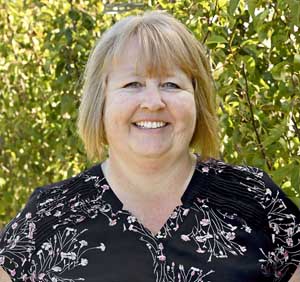Our tools and technology have evolved, and our ideas are bigger and bolder. Yet the pioneer spirit that animates Washington State University’s work for a resilient state and a productive, sustainable fruit industry has changed very little from our founding days.

As the first Cashup Davis Family Endowed Dean of the College of Agricultural, Human and Natural Resource Sciences, I have the honor of building on our institution’s 130-year legacy. (The endowment was created in 2019 by the family of Cashup Davis, a Palouse pioneer who homesteaded in the late 1880s in the Eastern Washington region that would become the breadbasket of the Pacific Northwest.)
Serving agriculture has been a focus throughout my professional life. Dairy and animal science opened for me an exciting window onto a wider world, one that soon expanded to livestock production and an array of staple, forage and specialty crops.
Educated at Cornell University and the University of Florida, I started out as an assistant professor in animal science at Iowa State University. I then moved to Michigan State University, where I served as director of environmental stewardship for animal agriculture and as a professor in the departments of animal science and biosystems and agricultural engineering.
At Michigan State University Extension, I was the first director of the university’s Agriculture and Agribusiness Institute, leading the charge to increase farmer success while ensuring food and environmental safety. Across many of these roles, I connected current research advances with industry outreach, providing knowledge and tools to help producers reduce their environmental impacts and stay competitive while meeting growing consumer demand.
I came to Washington in August 2022, after serving more than six years as the associate vice president for the University of California’s Division of Agriculture and Natural Resources. There, I oversaw county-based cooperative extension outreach, statewide programs and institutes, and nine research and extension centers across California. A big part of my role in the UC system was building the grower-researcher partnerships that are at the heart of the wider land-grant mission.
Throughout my journey, I’ve broadened my vision for agricultural research and my understanding of how it creates thriving industries, communities and environments. I wholeheartedly support our institution’s legacy of innovation — from the grower-scientist partnerships that formed our working farms and orchards many decades ago, to the strides being made today in breeding, technology and sustainability.
WSU CAHNRS is growing a more resilient Washington. Our faculty and students are working across the disciplines of science to develop crop varieties and practices that are hardier, more economical and more valuable and that support the industry while maintaining our natural resources. Discovery and education in our college creates an adaptable workforce, secures our food supply and grows thriving, healthy families and communities.
At research centers and orchards across Washington, WSU faculty, staff and students are promoting a stronger tree fruit industry through discoveries in breeding, genomics, crop protection, orchard management, automation, economics, food safety and many other fields. Examples of our efforts include the tangible impacts on orchard and environmental physiology, bacterial diseases and postharvest systems achieved with support from the historic WSU Tree Fruit Endowment. The tree fruit extension team continues to expand its outreach to partners through timely, multiplatform updates and bilingual resources, while the Little Cherry Disease Task Force is identifying ways to reduce the spread of this major concern.
It’s an exciting time for research, extension and learning in the department of viticulture and enology, launched in January under Founding Chair Jean Dodson Peterson. We’re expanding experiential learning offerings in wine science, working to make classes more accessible to students who require a flexible schedule, and updating our living laboratory spaces — from the winery to the vineyards and greenhouses. Shared dialogue with the wine industry and our alumni is increasingly important as we make strides toward our strategic priorities.
I welcome all partners to join me in fostering ideas that keep Washington agriculture strong. The days ahead will bring new opportunities to connect through our land-grant mission. I hope to see you at our bountiful Washington vineyards and orchards and am excited about what we can accomplish for our state, together.
—by Wendy Powers
Wendy Powers is the Cashup Davis Family Endowed Dean of the College of Agricultural, Human and Natural Resource Sciences at Washington State University. Her office can be reached at cahnrs.deans@wsu.edu.






Leave A Comment